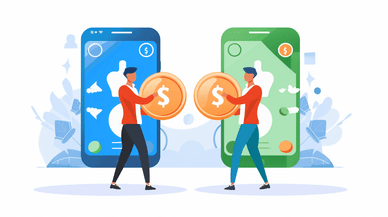Cash App or Venmo: Which App is Better?

The digital payments industry is constantly introducing new ways to manage finances, transfer funds, and carry out transactions. In this environment, the choice of a mobile payment application is never simple and clear-cut. However, Cash App and Venmo stand out among the best options available on the market.
So, which is better: Venmo or Cash App? In this article, we will discuss the differences between the two and compare the most important criteria of two leading mobile payment apps, including key features, fees, and security. Keep reading for an ultimate and in-depth review comparing Venmo vs. Cash App.
Cash App vs. Venmo: Features Overview
Venmo and Cash App work similarly, providing a simple, modern, secure, and convenient way to send and receive money digitally for free. These mobile payment apps have a lot in common — they both offer instant transactions, and work on Android, iOS, and web browser platforms. However, while Cash App is available in the US and UK, Venmo is only available to US users.

Cash App’s Key Features
Cash App is a P2P application that is designed for quick sending, receiving, and transferring of money, as well as for investing funds, which sets this payment service apart from its competitors. Cash App is well-known as an ecosystem that combines banking and investment services.
The app offers a unique money-saving feature, which allows users to put money aside into savings without any fees and round up transactions by putting the change into a savings balance. In addition, Cash App offers a free tax filing service.
Thus, the most significant difference between Cash App and Venmo is that Cash App provides advanced opportunities for businesses, allowing them to accept payments, track sales, and issue invoices.
Among the main shortcomings of this provider are transaction limits for new users, and the lack of joint accounts.
Venmo’s Key Features
Venmo is a P2P payment app that not only allows you to receive and send money and make payments but also offers unique features that enhance user experience. Venmo’s key selling point is the possibility to easily split bills with friends and family.
Another distinctive feature of Venmo is a built-in social network for communicating with friends and reading news feeds. The provider’s social component also allows users to add stickers to personalize payments. Furthermore, Venmo users can make their profile public so they can share their payments and monitor the actions of other network users.
When choosing between Cash App or Venmo, consider the fact that Venmo allows users to issue not only a debit card but also a credit card.
Among the main disadvantages of Venmo are the lack of support for international transactions, limited customer support, and fraud cases.
Cash App vs. Venmo: Fees Overview
By default, both Cash App and Venmo are free — there is no charge for downloading, opening an account, and using these mobile payment apps. However, when it comes to additional services and advanced functionality, extra fees may apply.

Overall, Venmo and Cash App offer similar deals — digital transactions through a linked debit card, bank account, or built-in app balance are completely free.
But there are also certain differences between the two.
We have already published materials about venmo what is it, how to use it, and how to create a venmo account in our previous articles.
Cash App’s Charges
- 0.5% to 1.75% fee ($0.25 minimum fee) for instant transfers;
- 3% fee for money transfers using a credit card;
- $2 fee for ATM transactions;
- 2.5% fee per transaction for business accounts and a 2.75% fee for accepting credit card payments.
Venmo’s Charges
- 1.75% fee ($0.25 minimum fee and $25 maximum fee) for instant transfers;
- 3% fee for sending money using a credit card;
- $2.50 fee for ATM transactions;
- 1.9% fee plus $0.10 per transaction for business accounts.
More information on how to use venmo for business transactions can be found on our website.
Cash App vs. Venmo: Security Comparison
Security is a critical issue for applications that handle financial transactions — both payment services offer advanced security features to protect users’ data, privacy, and funds.

If you are confused by the question of can my venmo be hacked or can my PayPal be hacked, let's look at what the two apps offer:
- Multi-level encryption;
- Two-factor authentication;
- Security locks;
- Anti-fraud technologies.
Both payment services have implemented the most powerful encryption technologies available to protect client confidentiality, sensitive data, and money. However, there is one difference that allows Cash App to be one step ahead of its competitors: the app’s users can use fingerprint identification in addition to the industry-standard two-factor authentication.
Final Thought
Cash App and Venmo are two payment ecosystems that have completely transformed the way we manage our transactions and payments. While the two have a lot in common, both services have unique and distinct features that make each an ideal option for specific use cases.
Once again, which is better: Cash App or Venmo? There is no universal answer; the choice depends on your needs, financial goals, and lifestyle. Cash App will be the better choice for users interested in investing and saving, as well as for those who need tax filing functionality. Venmo will be suitable for those looking for an advanced social experience, primarily transacting with friends and frequently splitting bills, as well as for those for whom credit card functionality is a must-have.
Therefore, whether Venmo or Cash App is better for you depends entirely on your lifestyle and financial habits. If all you need is a free mobile payment app, then both platforms are a great solution. Whatever you choose, remember that with both Cash App and Venmo, you’ll make your money transfers faster, more convenient, and more secure.
FAQ
What are the main differences between Cash App and Venmo?
Although both applications function similarly and have all the same standard functionality of a payment service, each of them has distinctive features. For instance, Cash App offers investment and money-saving services and also provides an advanced ecosystem for business accounts. Venmo, in turn, allows users to easily split bills and emphasizes sociality, allowing you to share information about your activities with other users.
How do I send and receive money with Venmo and Cash App?
Using Cash App and Venmo to send and receive money is easy — all you have to do is download the app to your device or open the web version on your PC and create an account. It’s completely free. Once you become a Cash App or Venmo user, you can carry out transactions and make payments.
What are the benefits of using Cash App and Venmo debit cards?
The Cash App debit card offers instant discounts and direct deposits, as well as round-ups, exclusive access, collections, collaborations, and more. The Venmo debit card also provides special offers such as offline and online cashback, rewards programs, ATM access, the ability to buy cryptocurrency, and so on.
